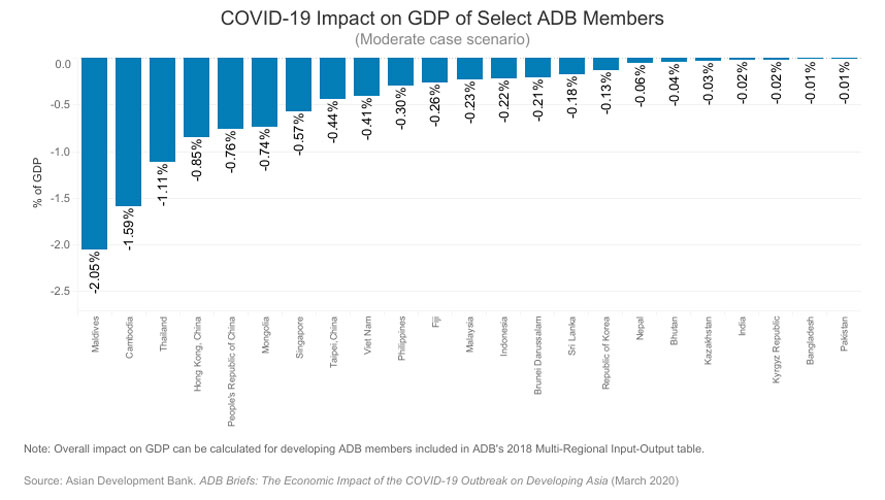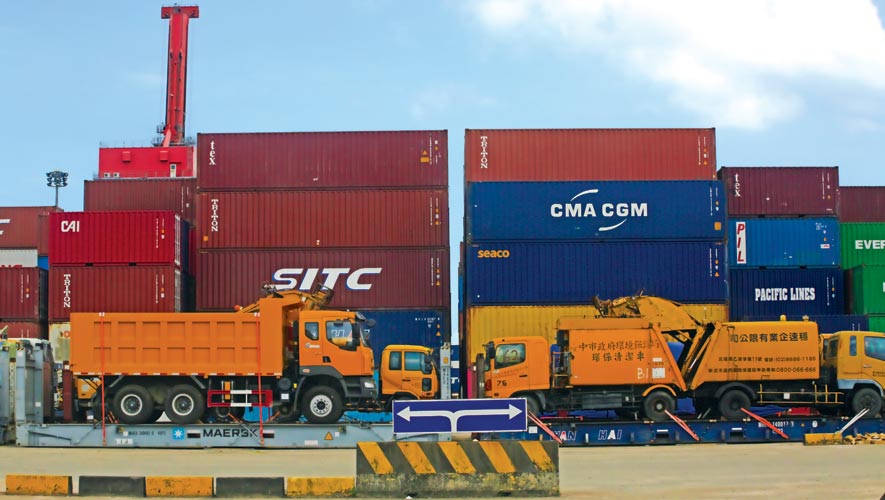Cambodia has experienced strong economic growth at an average of seven percent over the last two decades. However, the biggest financial spanner in the works that will temporarily stall this is of course a virus that goes by the name of COVID-19.
For the latest Cambodian Business news, visit Khmer Times Business
As the situation escalates and causes the World Health Organization to upgrade the contagion from an epidemic to a pandemic, the organisation has cut their projection for the Kingdom’s gross domestic product lower than 7 percent this year.
The Asian Development Bank (ADB) estimates that Cambodia, in a moderate-case scenario, will see 1.59 percent decline of its GDP, which is the highest rate among the 23 countries – just following Maldives whose GDP will see a 2.05 percent drop.
In its latest analysis, the ADB said COVID-19 will have a significant impact on Asia’s developing economies, which have seen sharp declines in domestic demand, tourism and business travel and trade, plus serious disruption to production links and supply chains.
In addition, the ADB identified the developing members that will be significantly affected are those with strong trade and production linkages with the People’s Republic of China. This of course includes Cambodia – the country’s textile and garment production factories rely on around 60 percent of raw materials from China to remain fully operational.
“In addition to tourism-dependent economies, other developing Asian economies such as Hong Kong, China, Mongolia, the Philippines, Singapore, Taipei, China and Vietnam will be materially affected by the COVID-19 outbreak beecause many of these economies see a significant share of tourists from China and are affected through that channel as well,” the ADB explained.
In a worst-case scenario for Cambodia, the ABD estimates that the Kingdom’s decline in tourism revenues could be $856.5 million, which translates to about 3.5 percent of the country’s GDP.
In 2019, the Kingdom welcomed 6.6 million tourists, a nearly 7 percent increase on the previous year. The sector generated roughly $5 billion and accounted for 12 percent of the country’s GDP. This year, however, the Ministry of Tourism has already predicted that Cambodia will experience a reduction of at least one million tourists, resulting in a 10 percent loss of revenue for the tourism sector.
Tourism is an important source of revenue for many developing economies in Asia, with the report highlighting that international tourism receipts account for more than 40 percent of the gross domestic product (GDP) in economies like Palau and the Maldives.
In the bigger picture, the ADB said the magnitude of global economic losses will depend on how the outbreak evolves, which remains highly uncertain. The analysis suggests that between $77 billion to $347 billion could be haemorrhaged, or 0.1 to 0.4 percent of global GDP.
US-based Moody’s Investors Service Inc, a leading provider of credit ratings, research, and risk analysis, has also forecasted the Kingdom’s real gross domestic product growth for this year at around 5.5 percent.
They reached this conclusion after taking into account several factors, including the detrimental effects of the virus and a recent decision approved by the European Union to remove 20 percent of the Kingdom’s Everything But Arms trade status.
The commission said the recommended partial withdrawal will specifically affect selected garment and footwear products and all travel goods and sugar, amounting to one-fifth of Cambodia’s yearly exports to the European Union, estimated at a loss of $1.1 billion.
According to the National Bank of Cambodia, last year the country’s exported garment products accounted for 56.67 percent of total exports, while exports of textiles and footwear accounted for 8.91 percent and 8.72 percent respectively. The main market destination for the products is the EU.
While the government’s announcement earlier this week that they have prepared an emergency reserve fund of between $800 million to $2 billion to deal with the ongoing crisis, that money has not just been magicked out of thin air. Prime Minister Hun Sen has revealed that government ministries budget will be slashed between 25 and 50 percent to create the necessary savings.




